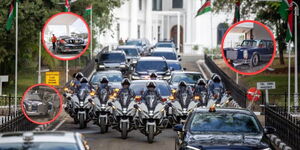South Sudan’s political landscape faces fresh turbulence as Vice President Riek Machar accuses Kenyan mediators of overstepping their mandate in ongoing peace negotiations.
In a sharply-worded letter addressed to the Kenyan mediation team, Machar, a key figure in South Sudan's political dynamics, expressed deep reservations about a proposed framework that he argues undermines existing peace agreements.
In his letter dated June 19, 2024, obtained by a Sudanese publication, the Sudan Tribune, Machar pointed out seven critical points where he believes the mediation team led by retired General Lazurus Sumbeiywo has deviated from its role.
Central to Machar’s concerns is the alleged intention of the mediation team to introduce alternative institutions that could run parallel to those established under the 2018 Revitalized Agreement on the Resolution of the Conflict in South Sudan (R-ARCSS).
Machar’s protest comes amid escalating tensions even before the commencement of talks slated for May, primarily involving armed groups that did not endorse the 2018 peace accord.
These groups, known as hold-outs, have demanded a return to Rome for discussions regarding their trust in President William Ruto of Kenya, who assumed mediation duties from Rome-based Sant’ Egidio community.
The contentious document in question, titled the Tumaini Consensus, aims to provide a framework for a permanent constitution and sustainable peace in South Sudan.
However, Machar asserts that it sidelines the R-ARCSS and effectively replaces it, contrary to its intended purpose of complementing the existing agreement by integrating non-signatory factions.
The negotiations, seen as pivotal for South Sudan's stability after years of civil strife, have drawn regional attention and support from African leaders advocating for an end to the conflict that has ravaged the country's economy.
The talks were launched under the stewardship of Lazurus Sumbeiywo, who previously mediated the Comprehensive Peace Agreement (CPA) in 2005, a precursor to South Sudan's independence.
President Salva Kiir's government and various rebel factions, excluded from previous peace deals, form the core parties involved in the discussions facilitated by President Ruto.
The initiative, named Tumaini meaning "hope" in Swahili, aims to mirror past successful African mediation efforts and contribute to the broader goal of silencing conflicts across the continent.
Analysts view the initiative not only as a platform for resolving South Sudan's internal strife but also as a testament to Africa's commitment to handling its challenges independently.
The ‘Silencing the Guns in Africa’ initiative, endorsed by the African Union, underscores this commitment, positioning Tumaini as a critical component in fostering regional stability and development.
Despite these aspirations, Machar's pointed critique signals significant discord within the mediation process, raising doubts about its inclusivity and adherence to established peace frameworks.
His insistence on the primacy of the R-ARCSS and opposition to parallel structures proposed by the mediation team point to the complexities involved in achieving lasting peace in South Sudan.












